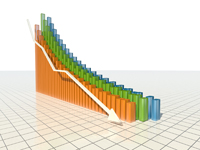Tumbling DC pots mean higher bills for companies
Wednesday, September 28, 2011

A lead consultant at UK consultancy Alexander Forbes has told Pension Funds Insider that the lower value of DC pension pots masks a real opportunity for young people to start saving - and requires that companies start paying higher pension contributions.
The value of the Alexander Forbes UK National Pensions Index has plummeted during a miserable summer for defined contribution (DC) pensions savers, prompting the comments from the financial services firm.
A 4.2 drop in the Index since March this year means that DC savers who were aged 30 in 2000 would now be expecting 38% less income in retirement than they reckoned with at the turn of the century. That assumes that the average saver maintained the same contribution levels while their projected retirement income has been hit by a series of disappointments in the equity market, poor annuity rates and greater life expectancies.
While this is not great news for anyone retiring in the near or mid-term future, Alan Carey said that for young savers "we see market dips as an opportunity for people to buy cheap."
Carey told Pension Funds Insider that "it's unlikely that market conditions would be that similar at all in 45 years time.
"We would hope that some semblance of normality would return, with annuity rates higher as bond yields go higher and a very good rate of growth from a low starting point in equity investing."
As for savers already building up their retirement eggs, the drop in the index (which was 100 in 2000 and now stands at a miserable 63.2) confirms that DC savers are very much at the mercy of the market.
Average 40-year-olds who were on course in the year 2000 to retire on a DC scheme with two-thirds of their final salary and maintained the level of contributions recommended at that point in time now need to make an eye-watering contribution of 75% of future salaries to meet that target.
Alexander Forbes suggests the problem can be somewhat overcome though by DC scheme members monitoring retirement income projections.
Carey said "despite the experience of the last six months, DC pension saving remains an intrinsically effective way to save for retirement. The most important message for DC savers from the index is the importance of reviewing their projected income regularly."
Increasing pension contributions to make up for market disappointments is suggested by the consultants as a means to 'smooth' the DC savings rollercoaster ride.
Carey explains that one idea being discussed in the world of DC plan design is that "if you are a paternalistic employer one very viable option would be to put in place a contribution structure that varies over time. They could say that while there would be a core contribution level they would put a little more in, or less, at certain times – and this might encourage employees to act in a similar manner."
A number of employers had already increased their contribution rates recently to make up for poor annuity rates, says Carey.